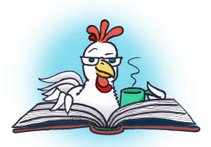What's the difference between a teen book and a middle grade book? (Besides the little publisher's note on the spine, that is.)
"Sex, drugs, violence" is the quick and easy answer, but as Dawn notes in a comment on her recent post, sometimes the distinction has more to do with emotional complexity and sophistication.
You can argue (and I have) that age distinctions for books are pretty arbitrary and marketing-driven to begin with. But as I get older and stodgier I'm more willing to concede that some titles are considered by consensus to be more appropriate for distinct age groups. Though I've sometimes been surprised at how many middle school students are happy and willing to read "down"--in subject matter, not reading level. Often they'll pick up and enjoy books that I would've guessed they would reject as too kiddish.
This could be a much longer post, but instead I'll just throw it out here: what makes you think "Now, this is a teen book"? Not a book for kids--or for adults, for that matter--that happens to have an adolescent protagonist?
(Though obviously real live teens read all of the above: kids' books, adult books, and books marketed especially to them.)
Subscribe to:
Post Comments (Atom)

1 comment:
Welcome to the blog world and the kidlitosphere!
I think that beyond the basics and the obvious situations - the content, swearing, so forth - another difference between teen fiction and juvenile fiction is the content and depth of the character's problem, and how his or her view of himself or herself or other people or the world is changed. There are juvenile books that are coming-of-age bildungsromans with such important lessons, so eloquently told, that they resound just as much with teens and adults. There are teen books that are trashy for trashy's sake (for popularity's sake) and there are those which show the delicate balance of that age between childhood and adulthood.
Post a Comment